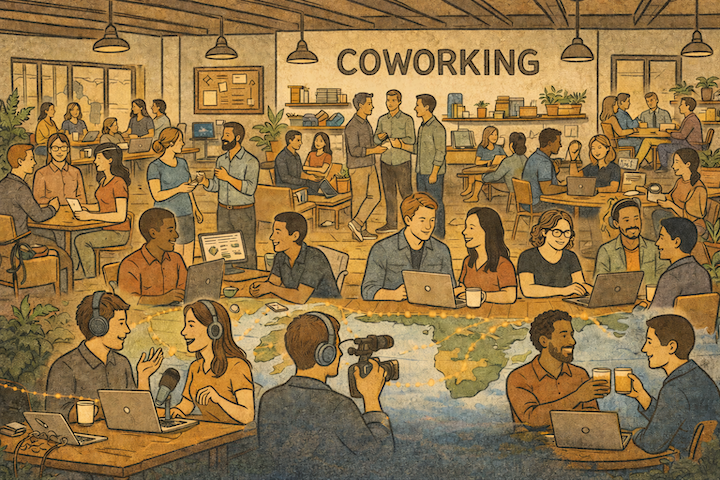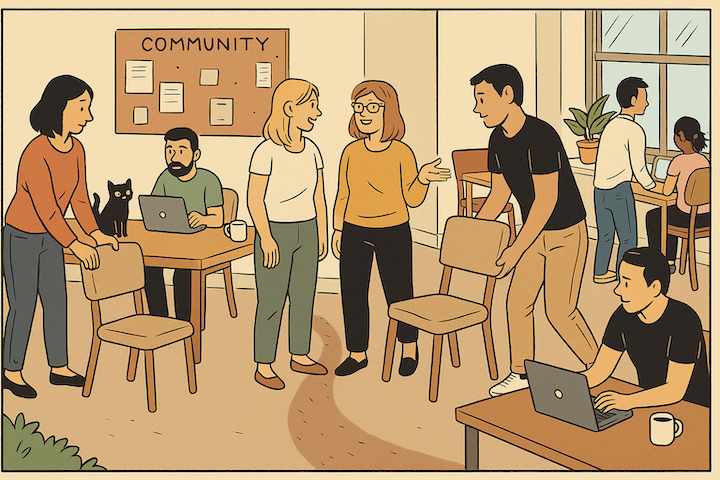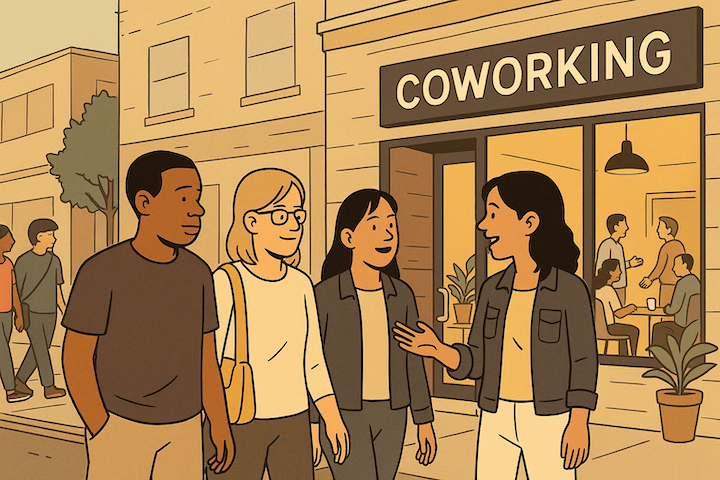This is a guest post by DeShawn Brown, CEO at Coworks, a software solution for today’s flex and coworking spaces. (And one of our amazing CJ Co partners.)
You want your coworking spaces to be hubs of innovation, creativity, and community. But running one isn’t just about providing desks and coffee—as you well know. It’s about creating an environment where entrepreneurs can thrive.
A research paper by Santeri Tuovila, Amplifying the Sounds and Rhythms of Entrepreneurial Community Spaces, looks at what makes spaces like yours truly effective for entrepreneurial development. It caught my eye for many reasons.
But first, who is the author and why should you care what his research shows?
Santeri Tuovila is “Science’s Potential Maximizer” at University of Helsinki. There, he organizes pre-incubator programs for “those who are forging their own path.” The paper itself was published while getting his MBA in Strategy at Tampere University. A degree, he said, which was “focused heavily on my master’s thesis on designing leadership through spaces, check more from my publications.”
Suffice it to say, he is a subject matter expert.
So who am I to provide this summary? Well, I am a technologist who has founded two companies within entrepreneurial environments, including software created from and explicitly for coworking.
And because you are short on time (aren’t we all), here are the top takeaways coworking operators can use to enhance your spaces, connect with members, and leverage technology to elevate your offerings.
1. Create key entrepreneurial moments
Entrepreneurial growth happens in specific moments: a brainstorming session that sparks a new idea, a chance encounter that leads to a partnership, or a supportive conversation that builds confidence.
According to Tuovila, “Entrepreneurial community spaces should be evaluated based on the situations they create and their ability to combine elements—the sounds—through responsive timing—the rhythm.”
As a coworking operator, think about how you can intentionally design your space and programs to foster these moments. Events like collaborative workshops, networking happy hours, and speaker panels create opportunities for members to connect and learn from each other. Even small things, like open seating areas that encourage interaction, can make a difference.
2. Tap into the power of tacit knowledge
One of the most valuable assets of a coworking space isn’t tangible. It’s the tacit knowledge—the unspoken, experience-based insights—shared among members. Tuovila’s research highlights that spaces succeed when they amplify this type of knowledge-sharing.
To encourage this:
- Set up shared work areas where casual conversations can naturally occur.
- Offer mentorship programs where seasoned entrepreneurs can guide newer members.
- Host “ask-me-anything” sessions featuring members with unique expertise.
When people feel comfortable sharing their knowledge, everyone benefits.
3. Leverage community managers as key facilitators
Community managers play an outsized role in shaping the culture and engagement of your space. Tuovila’s study confirms their importance, noting that “community managers support the socialization of coworkers by implementing socializing tools… and hosting events to facilitate networking.”
Your community manager is more than an admin—they’re a connector, a problem-solver, and sometimes even a cheerleader.
Empower them with tools and training to:
- Introduce members to one another based on shared interests or complementary skills.
- Facilitate icebreakers or group activities.
- Monitor the social pulse of the space to identify opportunities for connection.
With the right support, community managers can make your coworking space feel like home for entrepreneurs. The Lab Community is the perfect place for managers to get ongoing best practices from each other, find inspiration, and share wins and losses. We also like The Community Collective in Australia and Jamie Russo’s Everything Coworking Community Manager certification.
4. Balance structure and freedom
Maria Montessori used this approach in her classroom: freedom within limits. “Children learn best when they are given the freedom to explore and make choices, but also when they are provided with appropriate boundaries that help them develop self-regulation, responsibility, and respect for others.”
That applies to us as adults, as it turns out. Entrepreneurs need a mix of stability and flexibility to thrive. Tuovila refers to this as “structured freedom,” where spaces provide tools and opportunities for members to experiment without feeling overly constrained.
For example, ensure your members have access to a range of tools, from private meeting rooms to maker spaces with 3D printers. At the same time, let them personalize their experience. Offer flexible memberships that cater to different needs, whether they’re looking for a few hours a week or a dedicated office.
Technology can help here, too. With space management software like Coworks, you can:
- Allow members to book resources like meeting rooms on demand.
- Track usage patterns to understand what your members value most.
- Communicate updates and new offerings in real time.
5. Curate your community intentionally
Who you welcome into your space shapes its culture and appeal. Tuovila’s research notes that “social density provides an understanding of social possibilities for the viewer to engage,” which means the right mix of people fosters better interactions.
When marketing your space, be clear about the type of community you’re building. Highlight your values and the industries or interests you cater to. Encourage current members to refer like-minded peers to join. This approach not only strengthens your culture but also attracts members who will feel at home and want to stay.
6. Use technology to amplify engagement
Running a coworking space is as much about operational efficiency as it is about fostering connections. That’s where technology comes in. By using the right tech stack, you can make the experience seamless for members and give your team more time to focus on community-building.
As Tuovila points out, “The effective use of space relies heavily on how facilitators and members of the space use the opportunities to create or engage in key entrepreneurial situations.” The right software makes it easier to focus on creating those opportunities.
We all know that coworking spaces are more than physical locations—they’re ecosystems where entrepreneurs grow, collaborate, and succeed.
By learning from research like Tuovila’s and applying these insights, you can elevate your space into a true entrepreneurial powerhouse. And with tools like Coworks to streamline operations, you’ll have more time to focus on what matters: building a thriving, engaged community.
As someone who’s passionate about empowering entrepreneurs, I believe we have a unique vision of the future of work. Let’s make coworking spaces the launchpads for innovation they were always meant to be.
Thanks to our friends and partners at Coworks! Get in touch with DeShawn and the team for guidance and support with your coworking space software.
The Coworking Letter
For coworking pros


Get insights, strategies and practical to-do's every Thursday.







